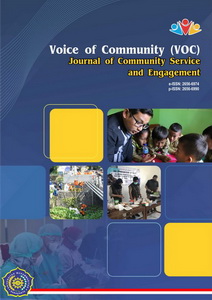Enhancing Community Knowledge Capacity in Waste Management Through a Waste Bank in Siwal Village, Sukoharjo
DOI:
https://doi.org/10.23917/voc.v5i2.10518Keywords:
waste bank, Waste Management, Digital Waste Management, Siwal Village, community empowermentAbstract
The increase in the volume and variety of waste in Siwal Village, Baki, Sukoharjo, has prompted the need for a management strategy that is not only technically oriented but also focuses on improving the knowledge capacity of the community. The growing population and settlements have led to waste that has not been managed optimally, with much of it still scattered on roads and public areas. This initiative aims to enhance community understanding and engagement in waste management through system digitalisation and continuous education. The partner in this initiative is BUMDes Citra Abadi Siwal, which currently lacks a structured waste management system and faces limitations in terms of human resources and infrastructure. Through outreach, training, and mentoring, the community is actively involved in developing community-based waste management systems. The education provided includes waste sorting, the use of a web-based waste bank system, and the importance of waste management as an economic opportunity. The results of the activity show an increase in community knowledge and participation, particularly in terms of waste disposal and sorting. The implementation of a digital system also facilitates record-keeping, monitoring, and enhances transparency in management. Despite challenges such as old habits and infrastructure limitations, this initiative has positively impacted environmental cleanliness and economic contributions through the BUMDes business unit. Thus, this initiative serves as a strategic step in enhancing community capacity toward sustainable waste management.
Downloads
References
Anna, A. N. (2017). Model pengelolaan bank sampah terpadu berbasis masyarakat pedesaan menuju Indonesia bebas sampah 2020 (Studi kasus di Desa Siwal, Kecamatan Baki, Sukoharjo). Laporan Penelitian PID. Surakarta: Universitas Muhammadiyah Surakarta.
Anna, A. N. (2019). Pengembangan aplikasi pengelolaan bank sampah digital di Desa Ngadirejo, Kartasura. Laporan Penelitian PID. Surakarta: Universitas Muhammadiyah Surakarta.
Aprillia, R., & Anggraini, I. M. (2019). Strategi pengelolaan sampah melalui analisis timbulan dan karakteristik sampah di Universitas Nahdlatul Ulama Kalimantan Barat. Jurnal Teknologi Lingkungan Lahan Basah, 7(2), 92–100.
Dermawan, D., Lahming, L., & Mandra, M. A. (2018). Kajian strategi pengelolaan sampah. UNM Environmental Journals, 1(3), 86. https://doi.org/10.26858/uej.v1i3.8074
Ismail, Y. (2019). Pengelolaan sampah berbasis masyarakat. Academics in Action: Journal of Community Empowerment, 1(1), 50. https://doi.org/10.33021/aia.v1i1.742
Kusumadinata, A. A. (2016). Pengelolaan sampah berbasis masyarakat. Media Pengabdian kepada Masyarakat Qardhul Hasan, 2(1), April.
Kusumawati, Y., Sutrisna, E., Wardiono, K., Anis, M., Darnoto, S., Zulaekah, S., Werdani, K. E., & Maimun, M. H. (2023). P2AD: Peningkatan kapasitas kader kesehatan dalam literasi kesehatan pencegahan penyakit tidak menular dan manajemen pengelolaan sampah di Desa Tawang Kecamatan Weru Kabupaten Sukoharjo. Laporan Pengabdian Masyarakat Skim P2AD. Surakarta: Fakultas Ilmu Kesehatan, Universitas Muhammadiyah Surakarta.
Mahlil, M., Mirja, M., Fatimah, F., & Furqan, M. (2021). Pengelolaan sampah berbasis masyarakat menjadi produk bernilai ekonomi (Studi di Gampong Nusa Kecamatan Lhoknga Kabupaten Aceh Besar). Jurnal Al-Ijtimaiyyah, 7(1). https://doi.org/10.22373/al-ijtimaiyyah.v7i1.9473
Nagong, A. (2020). Studi tentang pengelolaan sampah oleh Dinas Lingkungan Hidup Kota Samarinda berdasarkan Peraturan Daerah Kota Samarinda Nomor 02 Tahun 2011 tentang Pengelolaan Sampah. Jurnal Administrative Reform, 8(2), Desember.
Santhyami, S., Roziaty, E., Triastuti, T., Rahayu, R., Setyaningsih, E., Suryani, T., Aryani, I., Sari, S. K., Tias, E. P. A. N., Istifarini, F., Adityaradja, B., Andika, M. R., Wicaksono, M. G., & Ripdiyanti, A. D. (2022). Pemberdayaan siswa SMP Muhammadiyah 7 Program Unggulan Colomadu Karanganyar dalam program pilih pilah dan pulih sampah. Sasambo: Jurnal Abdimas (Journal of Community Service), 4(2), 229–240. https://doi.org/10.36312/sasambo.v4i2.664
Wahyudi, A. (2016). Analisis kebijakan pengelolaan sampah di Kota Samarinda: Problematisasi kebijakan dengan pendekatan WPR. Jurnal Borneo Administrator, 12(1). https://doi.org/10.24258/jba.v12i1.213
Downloads
Submitted
Accepted
Published
How to Cite
Issue
Section
License
Copyright (c) 2025 Anna Alif Noor, Jumadi, Dwi Astuti, Sri Darnoto, Dewi Novita Sari, Rudiyanto

This work is licensed under a Creative Commons Attribution 4.0 International License.








